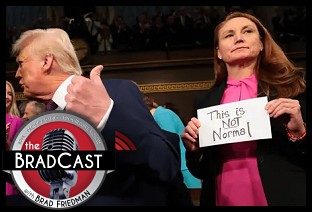 The first section of the Fifteenth Amendment to the Constitution, ratified in 1870 after the Civil War and the abolition of slavery, reads simply: "The right of citizens of the United States to vote shall not be denied or abridged by the United States or by any State on account of race, color, or previous condition of servitude."
The first section of the Fifteenth Amendment to the Constitution, ratified in 1870 after the Civil War and the abolition of slavery, reads simply: "The right of citizens of the United States to vote shall not be denied or abridged by the United States or by any State on account of race, color, or previous condition of servitude."
The second, and final section of the 15th Amendment, is even shorter: "The Congress shall have power to enforce this article by appropriate legislation."
Congress is charged with determining the "appropriate legislation" to assure that voters are not discriminated against on the basis of race. And, though it took almost another 100 years after the ratification of the 15th Amendment to do so, the Voting Rights Act (VRA) of 1965 was passed to help ensure exactly that.
In 2006, in continuing its duty to uphold the Constitution, after 21 Congressional hearings, including testimony that amounted to some 15,000 pages of evidence, the VRA was re-authorized for another 25 years by an astounding 98 to 0 margin in the U.S. Senate and a nearly-as-impressive 390 to 33 in the U.S. House.
"There was a lot of invidious discrimination shown," says Rep. James Sensenbrenner (R-WI), who chaired the U.S. House Judiciary Committee at the time. He characterized the hearings, which closely examined the extent to which racial discrimination still affects minority voters, as "one of the most extensive considerations of any piece of legislation that the United States Congress has dealt with in the twenty-seven and a half years that I have [served]."
That year's VRA re-authorization was signed into law by Republican George W. Bush. The law's three other federal re-authorizations (in 1970, 1975 and 1982) were also signed into law by Republican Presidents.
One of the most successful, and universally respected pieces of bi-partisan legislation in our nation's history, however, is now coming under serious attack from Republicans and a group of billionaire funders in the years following its last re-authorization. Since that year, an unprecedented number of challenges against the VRA --- specifically its Section 5, which applies to some 16 different jurisdictions with a long history of racial discrimination --- have been filed in the court system, at the same time that a tidal wave of voter suppression laws have been passed by GOP legislatures across the country, most notably, in many of the jurisdictions covered by Section 5.
A challenge to that section of the VRA, which served to block a number of new restrictions on voting and voter registration during the run-up to the 2012 election, will be heard by the U.S. Supreme Court on Wednesday, and the outlook for the crucial protections that Section 5 has offered for decades are now potentially in very grave danger of being struck down entirely...
Section 5, which covers all of Alabama, Alaska, Arizona, Georgia, Louisiana, Mississippi, South Carolina, Texas and Virginia, and portions of California, Florida, Michigan, New Hampshire, New York, North Carolina and South Dakota, requires that new election-related laws in those jurisdictions receive preclearance from either the Dept. of Justice or a federal court.
Thanks to Section 5, polling place photo ID restrictions in Texas and in South Carolina were blocked before last year's Presidential election, and restrictions on early voting in Florida as well as a purposefully discriminatory redistricting scheme in Texas were all turned back after Republicans in those states attempted to change the law for political advantage.
The once beloved VRA has come under new fire since 2010, as Republicans have decided that, suddenly, there is no more need for Section 5, that discrimination in those covered jurisdictions with historically high levels of discrimination are no longer any worse than anywhere else in the United States, and that, in any event, the law violates the premise of equal protection for all by forcing only certain jurisdictions to jump through hoops that other jurisdictions in the nation do not have to.
Section 5 has been upheld by the Supreme Court many times over the years, but after another largely unsuccessful challenge to it in 2009, just after the first inauguration of President Barack Obama, Republicans were emboldened by several signals offered by the new Rightwing Justices about the future of the provision.
"The historic accomplishments of the Voting Rights Act are undeniable," wrote Chief Justice John Roberts, "but the Act now raises serious constitutional concerns."
At ABC, Ariane DeVogue quotes the Chief Justice, long a foe of the VRA, charging that voter turnout and registration in the South, where a great number of states are covered by Section 5, "now approach parity," that "blatantly discriminatory evasions of federal decrees are rare" and that "minority candidates hold office at unprecedented levels."
"The evil that Section 5 is meant to address may no longer be concentrated in the jurisdictions singled out for preclearance," observed Roberts in 2009. "The statute's coverage formula is based on data that is now more than 35 years old, and there is considerable evidence that it fails to account for current political conditions."
Justice Clarence Thomas, in his minority opinion in the same case, wrote that "the lack of current evidence of intentional discrimination with respect to voting renders Section 5 unconstitutional."
Both Roberts and Thomas, apparently, failed to read the extraordinary body of "evidence of intentional discrimination" collected by their Republican colleagues in Congress in 2006. The record since then, particularly since the GOP takeover of many state legislatures at the beginning of 2011, has been even more striking.
"After the 2010 election, GOP officials approved laws in more than a dozen states to restrict the right to vote by requiring proof of citizenship to register to vote, shutting down voter registration drives, curtailing early voting, disenfranchising ex-felons and mandating government-issued photo IDs to cast a ballot --- all of which disproportionately target communities of color," writes Ari Berman in his recent cover story at The Nation, on both the history of the VRA and its new Supreme Court challenge. "The states covered by Section 5 were significantly more likely to pass such laws than those that are not," he argues.
"Past remains present to a disturbing degree in the South," Berman says. "States and counties with a history of voting discrimination in the 1960s and '70s are still trying to suppress their growing minority vote today. Six of the nine fully covered states have passed new voting restrictions since 2010, including voter ID laws (Alabama, Mississippi, South Carolina, Texas and Virginia), limits on early voting (Georgia) and restrictions on voter registration (Alabama and Texas). But only one-third of noncovered jurisdictions passed similar restrictions during the same period. The worst of the worst actors are still those covered by Section 5."
He also notes that "there have been more lawsuits challenging the constitutionality of Section 5 over the past two years than during the previous four decades."
"Taken as a group, the covered jurisdictions are not any worse in terms of discrimination," counters Carrie Severino, chief counsel of the Judicial Crisis Network, one of several who have joined Shelby County, AL v. Eric Holder, the case being heard on Wednesday in the Supreme Court, in order to challenge Section 5. "Congress should either base its extra burdens on states that show current problems with discrimination, or make voting regulations that apply equally to all states," argues Severino.
The lower court in the case had upheld Section 5, finding against Shelby County, and noting that "Congress drew reasonable conclusions from the extensive evidence it gathered" when the act was re-authorized in 2006.
For once, Congress had done its job and fulfilled its specified Constitutional role, as cited by the 15th Amendment. But now, Rightwingers are hoping for judicial activism to intercede and overturn the Constitutionally-delegated efforts of the legislative branch.
The argument against the notion that discrimination is no worse in the South and the other covered jurisdictions, seems to be belied by the Shelby County case itself, which Berman summarizes as follows:
A soft-spoken and civic-minded precision machinist, Montgomery grew up going to segregated schools until junior high, but he didn't think race was as big an issue in Calera as it was in other parts of the state. That changed in 2008, when he knocked on doors in the lily-white subdivisions of his new district-which he knew well from his time on the city planning commission-and was told by residents that they were supporting his opponent, who'd lived in the town for only three years. When asked why, they couldn't give him a good reason. Montgomery could come to only one conclusion: "they voted against me because of the color of my skin."
The Justice Department negated the election results and, after a year of negotiations, Calera moved from single-member districts to an at-large election system for the City Council. Montgomery was easily elected under the new system, winning the largest number of votes of any candidate, while his opponent from 2008 received the second-fewest. After the two elections, "I realized how important Section 5 is," Montgomery said.
It was this case that has become the basis for the challenge to Section 5 to be heard by SCOTUS on Wednesday. Berman says that Shelby County had no intention of challenging the VRA, but for pressure from Ed Blum, director of the Project on Fair Representation, "a conservative legal-defense fund devoted to fighting raced-based protections in public policy."
The funding for Blum's organization comes exclusively from Donors Trust, a rightwing dark money outfit which, reports Berman, "doled out $22 million to a Who's Who of influential conservative groups in 2010, including the American Legislative Exchange Council (ALEC), which drafted mock voter ID laws and a raft of controversial state-based legislation; the Americans for Prosperity Foundation, the Koch brothers' main public policy arm; as well as Grover Norquist's Americans for Tax Reform Foundation."
Donors Trust was recently highlighted by Suzanne Goldenberg at the UK's Guardian for fronting for "anonymous billionaires [who] donated $120m to more than 100 anti-climate groups working to discredit climate change science." Since Donors Trust is a non-profit 501(c)3, the millionaires and billionaires who donate to the hard right anti-voting, anti-science organization, also receive a tax-payer funded tax deduction for their efforts!
"Blum’s group does not have to disclose which funders of Donors Trust are giving him money, but he has identified two of them: the Bradley Foundation and the Searle Freedom Trust," Berman reports. "The Wisconsin-based Bradley Foundation paid for billboards in minority communities in Milwaukee during the 2010 election with the ominous message 'Voter Fraud Is a Felony!', which voting rights groups denounced as voter suppression. Both Bradley and Searle have given six-figure donations to ALEC in recent years, and Bradley funded a think tank in Wisconsin, the MacIver Institute, that hyped discredited claims of voter fraud to justify the state’s voter ID law, currently blocked in state court."
If Section 5 is struck down by SCOTUS, opponents argue, Section 2, which covers all 50 states can be used to stop discriminatory election laws. But Section 5 places the burden of proof onto the specific jurisdictions to demonstrate that their new laws will not have a discriminatory effect before they are put into practice. Section 2, on the other hand, allows for someone who has been discriminated against by such laws to sue. But the burden falls on them to prove that they have been discriminated against and, in most cases, it happens only after the damage has already been done.
The BRAD BLOG's legal analyst Ernest A. Canning has argued that the U.S. Dept. of Justice has an obligation to challenge discriminatory laws under Section 2 in jurisdictions not covered by Section 5. Though the more difficult burden of proof in such cases has meant that there have been far fewer such cases historically. In the waning days of the 2012 Presidential Election, the DoJ signaled to the Commonwealth of Pennsylvania, which is not covered by Section 5, that they were considering a Section 2 challenge to the polling place Photo ID restriction law passed just months before the election by the GOP legislative majority in that state. The worst provisions of that law --- which might have kept tens of thousands of otherwise perfectly legal voters from casting their vote last November --- were temporarily blocked by a state challenge (and recently blocked again from taking effect in their upcoming May primary), so the DoJ's potential Section 2 challenge has yet to move forward.
Still, the loss of Section 5 would be an enormous blow to the cause of voting and civil rights in this country. "Section 5 gives the federal government a more effective tool for combating discrimination in voting than anything else that Congress has ever come up with," Sam Bagenstos, former Deputy Asst. AG for Civil Rights in the Obama Justice Department told Berman.
While the Supreme Court has upheld Section 5 in the past, it may not do so this time around, given the hard right shift of the current court, their activist bent, and their willingness to intercede in duties specifically assigned to Congress by the U.S. Constitution.
"The disappearance of Section 5 would be a devastating setback for voting rights --- akin to the way the Citizens United decision eviscerated campaign finance regulation --- and would greenlight the kind of voter suppression attempts that proved so unpopular in 2012," Berman warns.
The court is expected to issue their ruling on the Constitutionality of Section 5 this Summer.
UPDATE 2/27/13: While it's always a perilous exercise to try and read the tea leaves from a SCOTUS hearing, Ari Berman, who was present in the court room this morning, Tweets, disturbingly, "In oral argument, Scalia likened Congressional support for Voting Rights Act to a 'perpetuation of racial entitlement'". He went on to indicate his "quick reaction", that while the 5 Republican Justices are "skeptical of Sec 5," there is a "small chance Kennedy can still be persuaded." He notes, that, incredibly, "Voter suppression attempts in last election didn't even come up during SCOTUS arguments about Voting Rights Act".
It seems this could be a very dark day. Because the Supreme Court still operates in the 1800s, there was no live audio or video of today's hearing. The transcript should be posted later today, and audio will be made available on Friday. So, more coming later on today's hearing, we suspect...
UPDATE 2/27/13, 11:19am PT: Our coverage now continues here, with still more disturbing reports out of this morning's SCOTUS hearing...


 Vets Push Back at Trump, Musk Plan to Slash Health Care, 80K V.A. Jobs: 'BradCast' 3/27/25
Vets Push Back at Trump, Musk Plan to Slash Health Care, 80K V.A. Jobs: 'BradCast' 3/27/25 'Green News Report' 3/27/25
'Green News Report' 3/27/25
 Signal Scandal Worsens for Trump, GOP; Big Election Victories for Dems in PA: 'BradCast' 3/26/25
Signal Scandal Worsens for Trump, GOP; Big Election Victories for Dems in PA: 'BradCast' 3/26/25 'Emptywheel' on Why Trump NatSec Team Should 'Resign in Disgrace' After Signal Chat Debacle: 'BradCast' 3/25/25
'Emptywheel' on Why Trump NatSec Team Should 'Resign in Disgrace' After Signal Chat Debacle: 'BradCast' 3/25/25 'Green News Report' 3/25/25
'Green News Report' 3/25/25 Postal Workers Union Prez: USPS 'Belongs to the People, Not the Billionaires':
Postal Workers Union Prez: USPS 'Belongs to the People, Not the Billionaires': Sunday 'Suddenly Conceivable' Toons
Sunday 'Suddenly Conceivable' Toons We're ALL Voice of America Now: 'BradCast' 3/20/25
We're ALL Voice of America Now: 'BradCast' 3/20/25 'Green News Report' 3/20/25
'Green News Report' 3/20/25 What Trump's 'Timber Production Expansion' Means (and Costs): 'BradCast' 3/19/25
What Trump's 'Timber Production Expansion' Means (and Costs): 'BradCast' 3/19/25 Courts Largely Holding Against Trump, Musk Lawlessness: 'BradCast' 3/18/25
Courts Largely Holding Against Trump, Musk Lawlessness: 'BradCast' 3/18/25 'Green News Report' 3/18/25
'Green News Report' 3/18/25 Chief VOA Reporter on Outlet Falling Silent First Time Since 1942: 'BradCast' 3/17/25
Chief VOA Reporter on Outlet Falling Silent First Time Since 1942: 'BradCast' 3/17/25 Sunday 'The Usual' Toons
Sunday 'The Usual' Toons 'Green News Report' 3/13/25
'Green News Report' 3/13/25 Trump EPA Unveils Plans to Endanger, Sicken Americans: 'BradCast' 3/13/25
Trump EPA Unveils Plans to Endanger, Sicken Americans: 'BradCast' 3/13/25 Trump Nixed Enforce-ment Against 100 Corp. Lawbreakers: 'BradCast' 3/12/25
Trump Nixed Enforce-ment Against 100 Corp. Lawbreakers: 'BradCast' 3/12/25 Bad Day for 'Strongmen': 'BradCast' 3/11
Bad Day for 'Strongmen': 'BradCast' 3/11 WI Election Could Flip Supreme Court Control, Musk Jumps In: 'BradCast' 3/10
WI Election Could Flip Supreme Court Control, Musk Jumps In: 'BradCast' 3/10 'What Else Could a Russian Asset Do That Trump Hasn't?': 'BradCast' 3/6/25
'What Else Could a Russian Asset Do That Trump Hasn't?': 'BradCast' 3/6/25 The Longest, Dullest, Most Lie-Filled 'SOTU' Ever: 'BradCast' 3/5/25
The Longest, Dullest, Most Lie-Filled 'SOTU' Ever: 'BradCast' 3/5/25 Trump Bad for Biz... and Farmers... and Nat'l Parks... and...: 'BradCast' 3/4/25
Trump Bad for Biz... and Farmers... and Nat'l Parks... and...: 'BradCast' 3/4/25 Trump Targeting 50% Cuts, Office Closures at Social Security: 'BradCast' 3/3/25
Trump Targeting 50% Cuts, Office Closures at Social Security: 'BradCast' 3/3/25
 VA GOP VOTER REG FRAUDSTER OFF HOOK
VA GOP VOTER REG FRAUDSTER OFF HOOK Criminal GOP Voter Registration Fraud Probe Expanding in VA
Criminal GOP Voter Registration Fraud Probe Expanding in VA DOJ PROBE SOUGHT AFTER VA ARREST
DOJ PROBE SOUGHT AFTER VA ARREST Arrest in VA: GOP Voter Reg Scandal Widens
Arrest in VA: GOP Voter Reg Scandal Widens ALL TOGETHER: ROVE, SPROUL, KOCHS, RNC
ALL TOGETHER: ROVE, SPROUL, KOCHS, RNC LATimes: RNC's 'Fired' Sproul Working for Repubs in 'as Many as 30 States'
LATimes: RNC's 'Fired' Sproul Working for Repubs in 'as Many as 30 States' 'Fired' Sproul Group 'Cloned', Still Working for Republicans in At Least 10 States
'Fired' Sproul Group 'Cloned', Still Working for Republicans in At Least 10 States FINALLY: FOX ON GOP REG FRAUD SCANDAL
FINALLY: FOX ON GOP REG FRAUD SCANDAL COLORADO FOLLOWS FLORIDA WITH GOP CRIMINAL INVESTIGATION
COLORADO FOLLOWS FLORIDA WITH GOP CRIMINAL INVESTIGATION CRIMINAL PROBE LAUNCHED INTO GOP VOTER REGISTRATION FRAUD SCANDAL IN FL
CRIMINAL PROBE LAUNCHED INTO GOP VOTER REGISTRATION FRAUD SCANDAL IN FL Brad Breaks PA Photo ID & GOP Registration Fraud Scandal News on Hartmann TV
Brad Breaks PA Photo ID & GOP Registration Fraud Scandal News on Hartmann TV  CAUGHT ON TAPE: COORDINATED NATIONWIDE GOP VOTER REG SCAM
CAUGHT ON TAPE: COORDINATED NATIONWIDE GOP VOTER REG SCAM CRIMINAL ELECTION FRAUD COMPLAINT FILED AGAINST GOP 'FRAUD' FIRM
CRIMINAL ELECTION FRAUD COMPLAINT FILED AGAINST GOP 'FRAUD' FIRM RICK SCOTT GETS ROLLED IN GOP REGISTRATION FRAUD SCANDAL
RICK SCOTT GETS ROLLED IN GOP REGISTRATION FRAUD SCANDAL VIDEO: Brad Breaks GOP Reg Fraud Scandal on Hartmann TV
VIDEO: Brad Breaks GOP Reg Fraud Scandal on Hartmann TV RNC FIRES NATIONAL VOTER REGISTRATION FIRM FOR FRAUD
RNC FIRES NATIONAL VOTER REGISTRATION FIRM FOR FRAUD EXCLUSIVE: Intvw w/ FL Official Who First Discovered GOP Reg Fraud
EXCLUSIVE: Intvw w/ FL Official Who First Discovered GOP Reg Fraud GOP REGISTRATION FRAUD FOUND IN FL
GOP REGISTRATION FRAUD FOUND IN FL


































